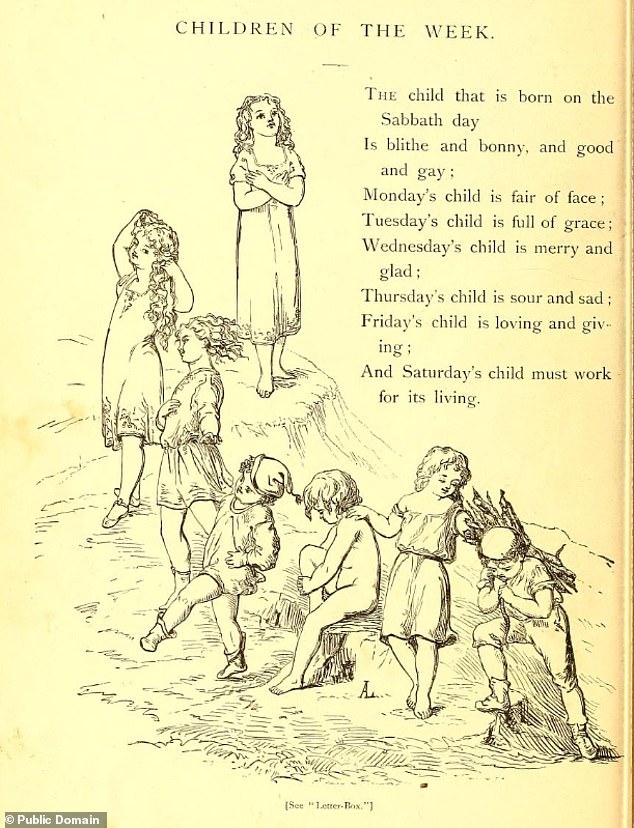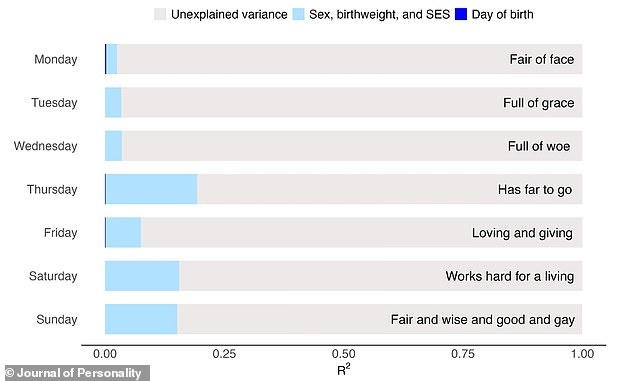We all know from the famous nursery rhyme that ‘Monday’s child is fair of face’, while ‘Tuesday’s child is full of grace’.
Unfortunately for people born on a Wednesday, they are ‘full of woe’, according to the rhyme, while Thursday’s child has ‘far to go’.
Meanwhile, Friday’s child is loving and giving, Saturday’s child works hard for a living, but the child that is born on Sabbath day is bonny and blithe, good and gay.
Whether there’s any truth in the popular fortune-telling song – dating back to 19th century England – has long been a mystery.
Now, a new study finally sheds light on what our day of birth really reveals about us.
Using data from more than 2,000 children, the researchers from the University of York investigated the link between a child’s day of birth and their destiny.
Thankfully for people born on a Wednesday, they found that Wednesday’s child is not ‘full of woe’ as we’ve been led to believe.
In fact, the age-old verse is simply ‘harmless fun’.

What day of the week were you born on? A new study investigated the link between a child’s day of birth and their destiny (file photo)

The nursery rhyme dates back to at least 1836, when it was published in ‘Traditions of Devonshire’ by English writer Anna-Eliza Bray. Note the variation in the final two lines – most notably with a reference to Christmas day instead of the Sabbath day (Sunday)
The nursery rhyme, simply called ‘Monday’s Child’, dates back to at least 1836, when it was published in ‘Traditions of Devonshire’ by English writer Anna-Eliza Bray.
Nearly 200 years later, the memorable verse is so popular that people born on a Wednesday are commonly described as ‘full of woe’, while those born on a Friday routinely get the compliment that they are ‘loving and giving’.
Of course, what day of the week you were born on may seem entirely incidental – and many people believe there is no truth in the nursery rhyme.
However, the research team theorized that it could actually be having lasting effects on personality.
For example, a child born on a Monday told they are ‘fair of face’ might, in theory, develop higher self-esteem, making them appear more confident and attractive to others.
Meanwhile, a child born on a Wednesday might interpret common feelings of sadness as proof of their ‘woe’, believing they experience these emotions more than others.
Parents familiar with the rhyme might also be more inclined to enrol a ‘Thursday’s child’ (‘full of grace’) in lessons for physical fitness, such as ballet – inadvertently shaping their physical development.
To investigate whether there’s truth to any of this, the team analysed data from a large study of more than 1,100 families with twins in England and Wales, tracking the siblings from age 5 to 18.

The popular nursery rhyme as published in St. Nicholas Magazine, 1873. Here, the last two lines are used to open the poem
The data included days of the week in which the children were born, as well as personality traits interpreted from the various lines in the poem.
For example, prosocial behaviour corresponded with ‘loving and giving’ and hardworking behaviour corresponded with ‘works hard for a living’.
‘Fair of face’, meanwhile, was based on attractiveness ratings from an independent figure when the children were at ages 5, 10, 12, and 18.
Overall, the team found no evidence that the day of the week a child is born influences their personality, appearance or future success.
A Wednesday’s child is no more likely to be ‘full of woe’ than a Monday’s child is to be ‘fair of face’, they report.
Instead, factors such as a family’s socio-economic status, a child’s sex and their birth weight are far more significant in predicting a child’s development.
According to Professor Sophie von Stumm, senior author at the University of York’s department of education, nursery rhymes like ‘Monday’s Child’ are simply ‘harmless fun’.
‘In an age where parents are increasingly concerned about the messages children encounter, our findings offer reassurance,’ she said.

The study found no connection between day of the week a child was born and their outcomes. Instead, factors such as a family’s socio-economic background, the child’s sex, and their birth weight are far more significant in predicting a child’s development

Pictured, box plots of children’s personality and physical traits by ‘Monday’s Child’ nursery rhyme, across days of the week of birth. Scores are plotted for one twin randomly selected from each pair
‘While many older tales and rhymes might seem out of step with modern values, our research indicates they don’t have any long-term influence on children.
‘We know these rhymes are rich in alliteration and vocabulary which has been shown to boost language and literacy, so parents should absolutely continue to share them.’
The team acknowledge that their study did not cover all the many possible interpretations of the ‘Monday’s Child’ nursery rhyme.
For example, researchers interpreted ‘full of grace’ as referring to having grace in physical mobility, such as being nimble and light on one’s feet, but it could also refer to being gracious in personality, meaning courteous, kind and pleasant.
Thursday’s child having ‘far to go’ may mean having good prospects for achieving success – as in ‘he’ll go far’ – or having an arduous road ahead.
The team admit that no data was available on the extent to which the families were familiar with, engaged in, or adhered to ‘Monday’s Child’.
‘Thus, we could not ascertain whether our findings were confounded by family-level differences in children’s and parents’ endorsement of the verses,’ they say in their paper, published in Journal of Personality.
